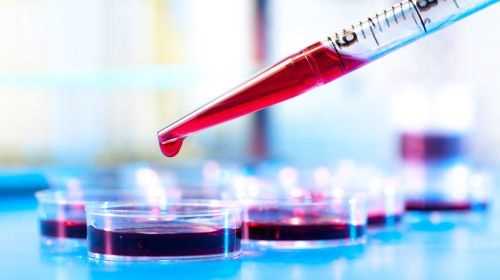Too much not only harms the heart. Proper nutrition can compensate for increased values.
Triglycerides (also: triglycerides, neutral fats) belong to the group of fats. The main task of fats in the body is to function as an energy supplier and energy store. Like cholesterol, they are also considered a risk factor for cardiovascular diseases.
The body produces some of the fats itself. We ingest a large part of the triglycerides with our food – around 90 percent of all dietary fats are triglycerides. They come from butter, oil, meat, dairy products, and other fatty foods.
Article content at a glance:
When is the triglyceride level determined?
In order to classify the risk of possible cardiovascular diseases such as heart attack or stroke, but also the risk of vascular disease such as arteriosclerosis, the doctor has the triglyceride levels determined. The values are always measured and interpreted with the other blood lipid values (total cholesterol, HDL and LDL cholesterol).
How are triglyceride levels determined?
The triglyceride level is determined in the blood serum. Patients should be fasted to collect blood. You should not have drunk any alcohol at least twelve hours beforehand.
Normal range for triglycerides in the blood
The triglyceride values are below 150 milligrams per deciliter (mg / dl) or 1.7 millimoles per liter (mmol / l) in the normal range.
Causes of too high triglyceride levels
An increased level of triglycerides alone is usually harmless to health. Only in combination with a high level of the harmful LDL cholesterol does the risk of arteriosclerosis increase and thus the risk of cardiovascular diseases such as heart attack, coronary artery disease (CHD), and stroke.
Elevated triglyceride levels are also found in:
The triglyceride level can also increase during pregnancy and when taking medication (cortisone, birth control pills, estrogens, dehydrating agents).
If the triglyceride levels are very high, there may be a disease of the pancreas.
Low triglyceride levels in the blood
Triglyceride values below the normal range are of no medical significance and only rarely occur in affluent nations. Possible causes are hyperthyroidism as well as undernourishment and malnutrition. Excessive intake of medication designed to lower the triglyceride level in the blood can also lead to decreased levels.
Lower triglyceride levels naturally
The triglyceride concentration in the blood depends to a large extent on the food consumed. Particularly saturated fatty acids (animal fat in sausage, cheese and high-fat meat) and carbohydrates that are quickly broken down by the body (in sugar, confectionery, white flour) have an unfavorable effect on the triglyceride value. A high-fiber diet with whole grain products and unsaturated fatty acids, the reduction of excess weight and the avoidance of alcohol help to lower the triglyceride level.
.


